Did you notice a disconnect between your click-through rate and conversion rate? It’s time to check the issues and optimize your website
Generating customers through digital marketing is now one of the most popular tactics for promoting your brand. Popular, but not easy.
As a site owner, you want your website to drive traffic and engage prospects. But it takes time and experience to hit organic search results and you have lots of other issues to solve at the moment. So, you launch a PPC campaign for your e-commerce website, hoping for fast results… but nothing has happened.
Download our Individual Membership Resource – Google Ads strategy guide
Use this guide to review your approach to Paid Search and improve the ROI you can achieve from Google Ads Campaigns - All in 7 practical steps.
Access the
Perhaps, not exactly nothing. Your traffic levels and click-through rate (CTR) were probably both quite promising in the beginning. However, this doesn't mean visitors will automatically translate into a significant number of sales or even demo requests.
In this article, you’ll discover how to identify the reasons for the high CTR and low conversions, as well as learn what to do to drive sales with your ads.
Is there a disconnect between your landing page and ad copy?
This is the first question you should ask yourself when your PPC campaign results don't meet your expectations. What if your ad copy doesn’t correspond with the landing page it leads to? When users find out your landing page content is different from what you’ve promised them in the ad, they’ll get discouraged and are more likely to leave the page.
Let’s suppose I’m looking for Airpods on Google and got an ‘AirPods for $100’ ad in the top results. Although I understand it’s almost impossible to get them for this price, I’ll follow the link to see what they suggest to me (and the website owner will pay for my click). However, I’ll see there are only fake or used accessories on the page and quickly return to search results. Thousands of users will do the same again and again until the advertisers’ budget comes to an end.
'This happens to those who try to trick their audience, and I’m not that kind of person' you may think. There’s one more possible scenario for you. You could accidentally redirect users clicking through your ad to the wrong page, e.g. to your home page. Even if some users end up finding the right page, most of the visitors won’t stay long on your site.

Check whether your ads are ranking for the right keywords
Did you research keywords properly before starting your paid campaign? The biggest mistake marketers or business owners can make is to skip keyword research and choose only high-volume phrases. It's important that you remember you don’t need your campaign keywords to be incredibly popular, they just need to be relevant.
Ranking for short, high-volume queries (consisting of one or two words) is the most common reason for high CTR and low conversion rate.
Let’s say I’m searching for 'flower delivery,' and your ad offers me exactly what I need:

There’s only one problem. I mentioned neither the city I want to get flowers delivered to (although Google can identify my location, it isn’t able to read my thoughts and understand where I want to send a bouquet) nor the occasion I need flowers for. As the query is pretty general, there is a high chance visitors won’t convert and will instead decide to specify their search question. Long-tail keywords would be the best option for you in this case.
If you realized you’d selected the wrong keywords for your ads, collecting the right ones isn’t difficult at all. All you need is an SEO tool and some time. I usually use Serpstat for this purpose.
To start keyword research, enter a word or a phrase best describing what you offer in your ad into the search field then select the country you want to rank for and click on Search.
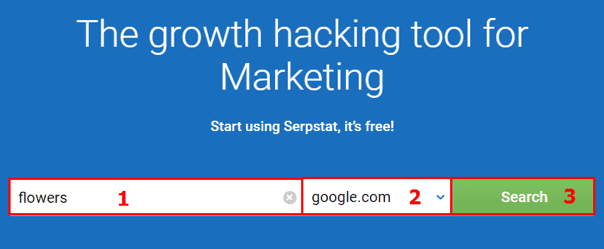
You’ll come to the Overview page, which includes comprehensive data on the keyword you’ve entered. Now go to PPC Research > Keywords. Here you’ll see all the phrases containing your main keyword, their volume, cost-per-click, competition and ad examples. To collect long-tail phrases, filter keywords by the number of words (approximately between two and five) and enter the words your key phrase should contain (your location or competitive advantage):
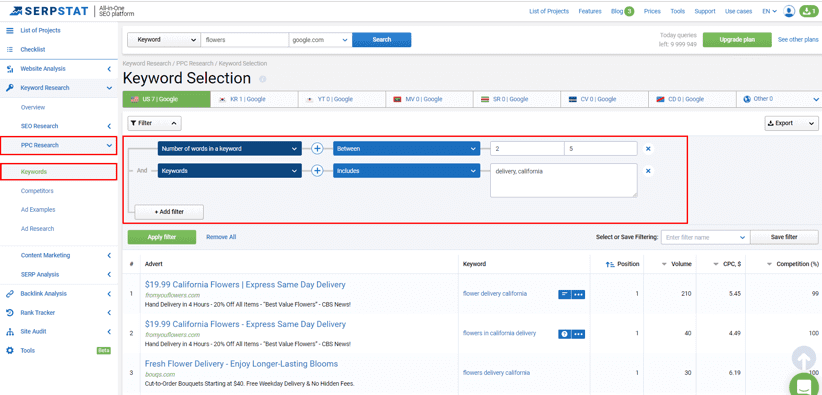
Export the list you’ve got and implement the best keywords into your campaign - don’t forget to add them into your ad copies.
Are your ads ranking for competitors’ branded queries?
Of course, it’s not forbidden, but adding your competitors’ branded keywords to your PPC campaign may play against you. People searching for branded queries don’t need advertising, as they already know what they need.
Of course, some of them may click through your ad and decide your company would be a better decision for them, but it’s still pretty risky. In fact, users conducting a branded search will click through your ad by chance, as they didn’t expect to see anything but the target company’s site on the first position.
Here’s what I’ve seen when searched for ‘serpstat:’
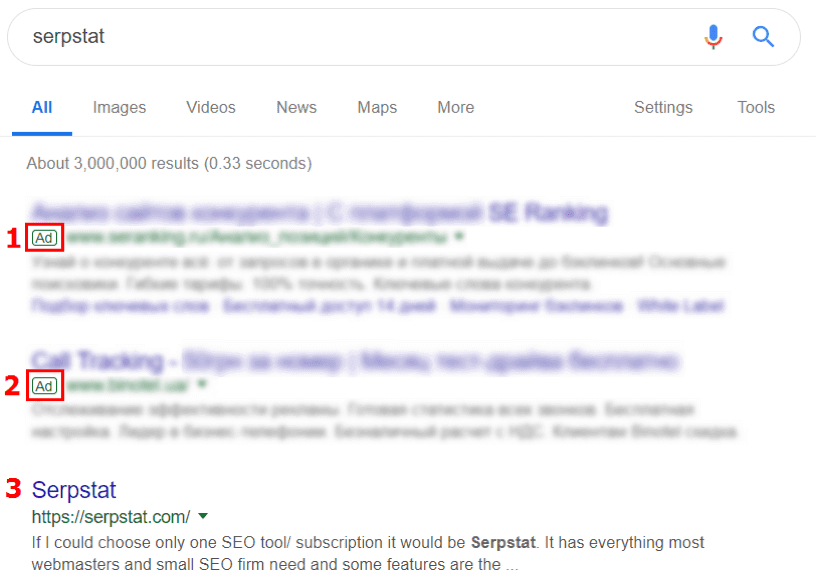
The company’s site is in the third position, as the first two are taken by other companies’ ads. If you do the same and your conversion rate isn’t significant at all, it might be time to rethink your strategy.
Fix technical issues if any
How often did you leave the page before you even saw the content? It’s not a secret people don’t like to wait. The time required for your landing page to get fully loaded will influence whether your prospects will convert or not.
Google stated that every second of load time might result in your conversion rate dropping by 12%. If you don’t want to experience these stats, check your page speed before it’s too late. PageSpeed Insights will help you analyze your page performance for free.
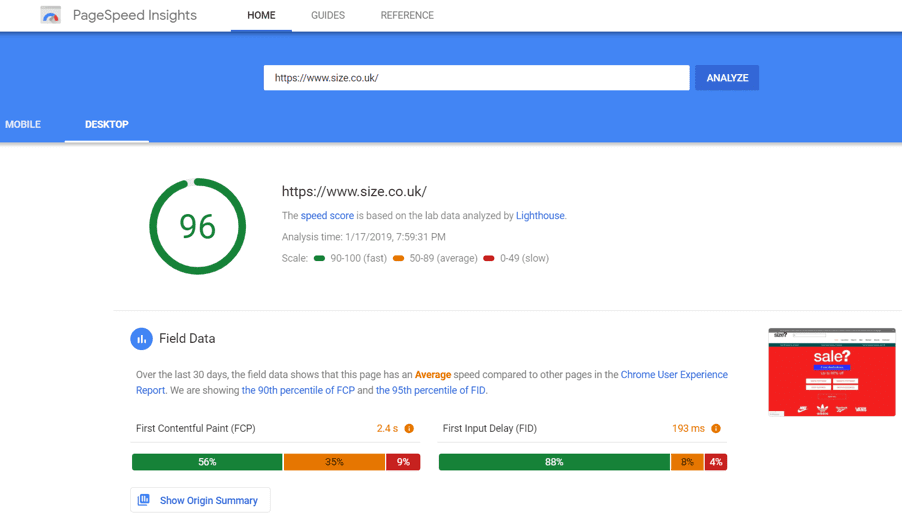
However, it's important to note that while your desktop version may load quickly, the mobile version may be much slower.
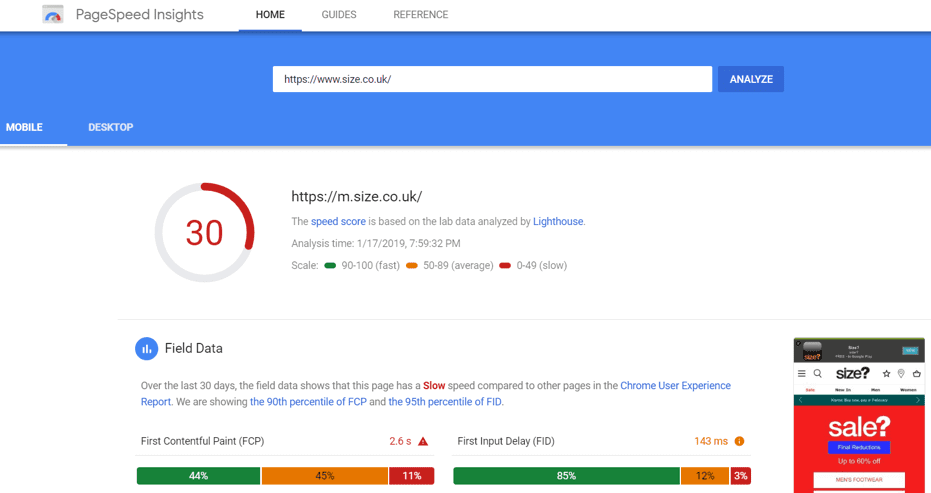
By the way, mobile optimization is a crucial factor for your digital marketing strategy. If you don’t provide the mobile-friendly design for your landing page, you ignore more than a half of your prospects.
You could have failed to consider some crucial factors
What if everything is alright with your campaign and it's just that your metrics are not providing you with precise data? I mean, you can’t always consider all the factors influencing user behavior. For instance, if your prospects visit your landing page from their laptops during the working day, they won’t leave a callback request. But they may come to a purchasing decision later and contact your company via their smartphones.
So, when evaluating your campaign results, make sure you consider the time and device type they use when clicking through your ad.
Conclusion
Launching a PPC campaign and seeing you spend your budget in vain is pretty frustrating. Still, you shouldn’t give up and leave your campaign to its own devices. High CTR is a sign that you’re only half wrong and you have a chance to fix some issues in order to drive conversions. Here are the essential steps you should undertake to identify and address the causes of low conversion rate:
- Make sure your landing page is in-line with your ad.
- Conduct proper keyword research.
- Avoid ranking for competitors’ branded queries.
- Fix technical issues and provide a mobile-friendly website design.
- Consider the fact that you could have overlooked some factors.
Inna Yatsyna is a Brand and Community Manager at
Serpstat, an all-in-one SEO platform. Inna is experienced in digital and content marketing, along with SEO. She’s fond of writing useful posts, helping people, reading, traveling, and animals (especially dogs).













